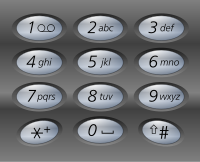Problem Link
https://leetcode.com/problems/letter-combinations-of-a-phone-number/
Summary
정렬을 활용하는 문제
Description
Given a string containing digits from 2-9 inclusive, return all possible letter combinations that the number could represent. Return the answer in any order.
A mapping of digit to letters (just like on the telephone buttons) is given below. Note that 1 does not map to any letters.
Checking List
- 혼자서 문제를 해결
- 힌트를 보고 해결
- 답을 보고 해결
My Answer
- Runtime: 28 ms, faster than 81.19%
- Memory Usage: 14.2 MB, less than 85.76%
class Solution:
def letterCombinations(self, digits: str) -> List[str]:
from itertools import product
phone = {'1':[],
'2':['a','b','c'],
'3':['d','e','f'],
'4':['g','h','i'],
'5':['j','k','l'],
'6':['m','n','o'],
'7':['p','q','r','s'],
'8':['t','u','v'],
'9':['w','x','y','z']
}
push = []
for n in digits:
push.append(phone[n])
result = []
for c in list(product(*push)):
if c == ():
continue
result.append(''.join(c))
return resultAnswer Sheet
- 같은 방식이지만 조금 더 간결한 코드
class Solution:
def letterCombinations(self, digits: str) -> List[str]:
from itertools import product
phone = {
'2': ['a', 'b', 'c'],
'3': ['d', 'e', 'f'],
'4': ['g', 'h', 'i'],
'5': ['j', 'k', 'l'],
'6': ['m', 'n', 'o'],
'7': ['p', 'q', 'r', 's'],
'8': ['t', 'u', 'v'],
'9': ['w', 'x', 'y', 'z']
}
return [''.join(x) for x in product(*(phone[i] for i in digits)) if x]출처: leetcode:Discuss
- 가장 좋아요가 많았던 코드 (재귀 사용)
class Solution(object):
def letterCombinations(self, digits):
mapping = {'2': 'abc', '3': 'def', '4': 'ghi', '5': 'jkl',
'6': 'mno', '7': 'pqrs', '8': 'tuv', '9': 'wxyz'}
if len(digits) == 0:
return []
if len(digits) == 1:
return list(mapping[digits[0]])
prev = self.letterCombinations(digits[:-1])
additional = mapping[digits[-1]]
return [s + c for s in prev for c in additional]출처: leetcode:Discuss
- DFS를 사용한 방법
class Solution(object):
def letterCombinations(self, digits):
if not digits:
return []
m = {"2":"abc", '3':"def", '4':"ghi", '5':"jkl", '6':"mno", '7':"pqrs", '8':"tuv", '9':"wxyz"}
ret = []
self.dfs(m, digits, "", ret)
return ret
def dfs(self, m, digits, path, ret):
if not digits:
ret.append(path)
return
for c in m[digits[0]]:
self.dfs(m, digits[1:], path+c, ret)출처: leetcode:Discuss
Trial & Error
- 리스트 간 조합을 어떻게 만들지에 대해 고민했는데 itertool의 product를 사용해서 해결했다.
Takeaway
- 여러 조합들이 필요한 문제의 경우 DFS를 활용하는 것이 좋을 것 같다.
- itertool.product() 동작 방법에 대해 배우는 계기가 되었다.
def product(*args, repeat=1):
# product('ABCD', 'xy') --> Ax Ay Bx By Cx Cy Dx Dy
# product(range(2), repeat=3) --> 000 001 010 011 100 101 110 111
pools = [tuple(pool) for pool in args] * repeat
result = [[]]
for pool in pools:
result = [x+[y] for x in result for y in pool]
for prod in result:
yield tuple(prod)